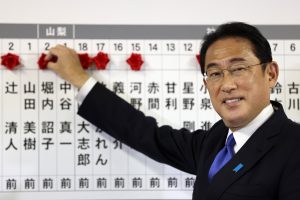Japan’s governing Liberal Democratic Party (LDP) has retained its overall majority in the Diet following Sunday’s lower house election. With 465 seats up for grabs, the LDP and junior coalition partner Komeito won a total of 293 seats, well exceeding the threshold of 244 seats needed to a stable majority, which allows the LDP to dominate each House of Representatives standing committees.
Initial polls suggested the LDP would lose seats from a pre-election level of 305 but would retain a simple majority.
On Monday, Prime Minister and LDP leader Kishida Fumio held a press conference thanking the public for giving him their confidence. Kishida now has a mandate to push a stimulus package worth “tens of trillions of yen” to help revive Japan’s pandemic-stricken economy.
The election was considered a test for Kishida, who won the LDP leadership race in September. There were concerns about how popular Kishida’s new cabinet would be with voters, given his reputation as a “status quo” politician. The LDP was heavily criticized for its handling of the coronavirus pandemic and the deadly fifth wave during the Tokyo Olympics, which led to the resignation of Prime Minister Suga Yoshihide in September.
While voter turnout is generally low in Japan, this year it reached 55 percent, higher than the previous election four years ago, showing increased interest in the race.
Japan’s main opposition party, the Constitutional Democratic Party of Japan (CDP), had hoped to win additional seats through a coalition with five opposition parties including the Japan Communist Party. Instead, the CDP suffered a significant loss, falling short of the 110 seats it held before the election. The party had been projected to secure an additional 40 seats, but went on to win just 96 seats in total. Their bid to unify the opposition bloc by fielding a single candidate across 217 electoral districts did not win the support from voters they had hoped for.
A significant number of voters critical of the LDP turned to the Japan Innovation Party (Nippon Ishin no Kai), whose seat total unexpectedly quadrupled from 11 to 41. The JIP is now the third largest political party in Japan’s lower house, after the LDP and CDP. The party, whose home base is in Osaka, did not join the opposition bloc. Instead, the JIP presented themselves as a libertarian “third force,” which is said to have attracted swing voters.
The CDP’s major defeat stemmed from a fall in votes received in the proportional representation system, where voters choose their preferred party rather than voting for a specific candidate. On the other hand, the JIP won a seat in every proportional representation block except Hokkaido.
The CDP’s aim to weaken the dominance of the LDP, which has been in power almost continuously since the 1950s, through ideological values along with political sweeteners fell flat. The CDP’s appeal to voters with tax hikes on large corporations and the wealthy and a temporary halt on income tax for low-income earners appears to have had limited impact.
Meanwhile, the CDP’s election strategy to unify candidates with the Japan Communist Party may have backfired. An exit poll by Yomiuri Shimbun found that 82 percent of Japanese Communist Party supporters voted for candidates of the main opposition CDP, while only 46 percent of CDP supporters voted for JCP candidates. That suggests misgivings toward the party’s new left-leaning alliance, even among the CDP’s own supporters.
Of the 217 constituencies where the five opposition parties unified their candidates, the LDP-Komeito won 140 and the opposition won 61. Conversely, in the 76 constituencies without unified opposition candidates, the opposition won only nine districts and the LDP won 61.
In a sign of the party’s dismal showing, CDP leader Edano Yukio fought a tight race in his Saitama district 5 constituency, winning by just 6,000 votes. CDP deputy leader Tsujimoto Kiyomi lost her lower house seat to a Japan Innovation Party candidate. There have been calls for the executive committee of the CDP, including Edano, to step down in response to the defeat.
The LDP also lost high-profile candidates. Secretary General Nikai Toshihiro, a close ally of former Prime Minister Abe Shinzo, lost his seat to CDP newcomer Futori Hideshi, 44. Former LDP secretary general Ishihara Nobuteru lost his seat in a district within Tokyo to CDP candidate Yoshida Harumi.
Only 45 women were elected to Japan’s lower house, making up just 9.7 percent of the 465 seats. The government’s goal of having women comprising 35 percent of election candidates by 2025 is looking more and more unlikely.
































